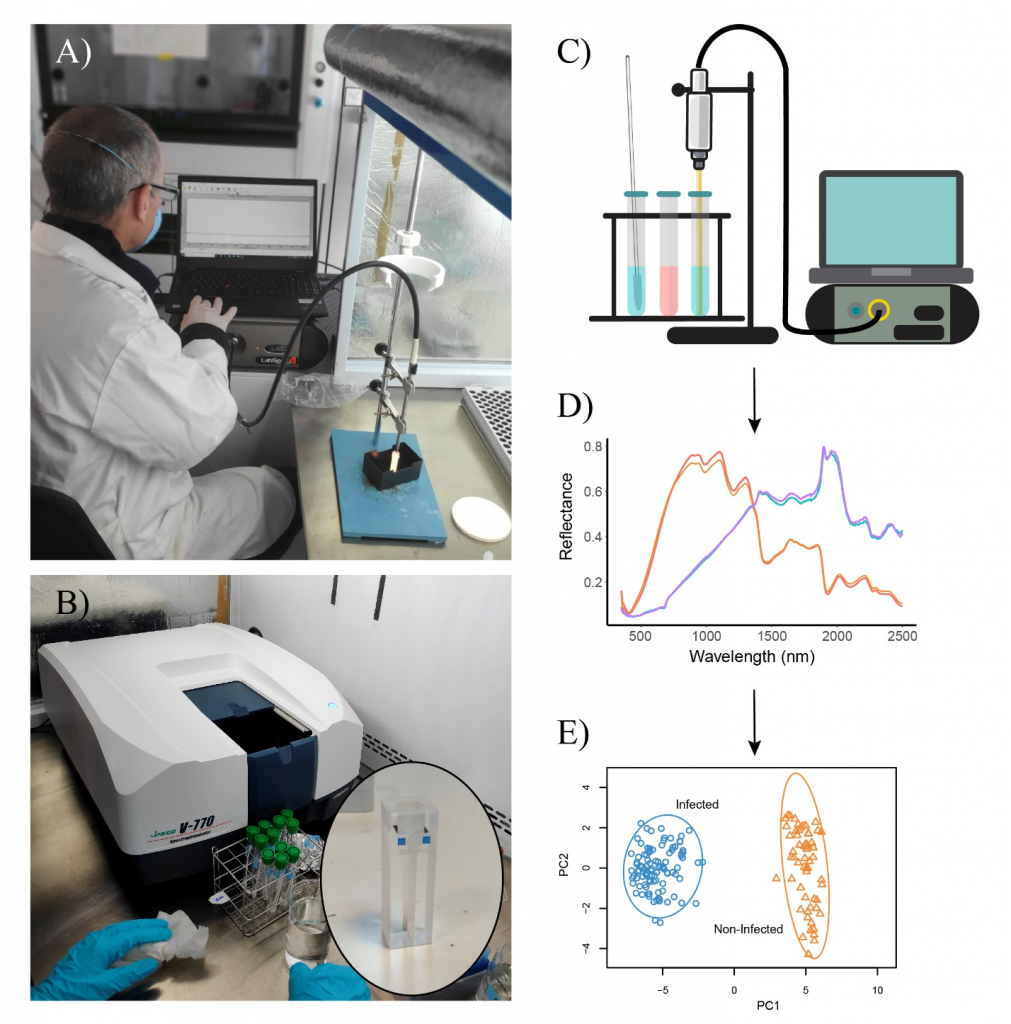COVINIRS

The serious consequences of the COVID-19 pandemic have highlighted the need for rapid and accurate diagnostic methods that allow for the quick control of the spread of infectious diseases and lead to proper health and economic crisis management. The most accurate methods (PCR tests) are slow, expensive, and need to be conducted in a laboratory, while antigen and antibody tests, although fast and economical, are less precise and depend on the supply of an international market that can collapse.
OBJETIVO
The COVINIRS project proposed in 2020 the possibility of a solution to this problem using near-infrared spectroscopy (NIRS) as a rapid, accurate, economical, and portable analytical method for diagnosing this and other infectious diseases in the future. NIRS is a non-invasive technology that allows for the analysis of multiple samples per minute and, through an algorithm developed from statistical models, provides a response within seconds regarding the likelihood of infection in a patient or apparently healthy individual.
DESARROLLO
This project was carried out by the company Boscalia Technologies S.L., together with Rey Juan Carlos University (URJC, where the principal investigator, Dr. Silvia Matesanz, is affiliated) and the University of Alcalá. Partially financed by URJC, the project analyzed over 1,825 nasopharyngeal swabs obtained through collaboration with various healthcare centers*. Sensitivity values of 85% and specificity values close to 70% were achieved, demonstrating the enormous potential of NIR spectroscopy as a diagnostic method for infectious diseases. Equipment was provided by URJC, Boscalia Technologies, INTA, JASCO Analytical Spain, and BONSAI Advanced Technologies.

*Hospital Clínic de Valencia (a través del INCLIVA), Hospital Universitario Fundación Alcorcón, Hospital General Universitario Gregorio Marañón y Hospital Universitario Rey Juan Carlos, Centro de Salud de Íscar, Hospital Clínico Universitario de Valladolid.
Project Dissemination in the Media:
Al Rojo Vivo | La Sexta: Así funcionaría la espectroscopía IR para la detección precoz del Covid-19.
Ana Rosa | Telecinco: Nuevas técnicas Coronavirus.
Boulevard | Radio Euskadi: IR para detectar Covid-19 con Manuel de Luque.
Actualidad | Diario digital: La Universidad de Alcalá colabora en la iniciativa COVINIRS.
Castilla la Mancha de Ciencia | El diario: Proyecto COVINIRS una alternativa a la PCR.
COVINIRS

The serious consequences of the COVID-19 pandemic have highlighted the need for rapid and accurate diagnostic methods that allow for the quick control of the spread of infectious diseases and lead to proper health and economic crisis management. The most accurate methods (PCR tests) are slow, expensive, and need to be conducted in a laboratory, while antigen and antibody tests, although fast and economical, are less precise and depend on the supply of an international market that can collapse.
OBJETIVO
The COVINIRS project proposed in 2020 the possibility of a solution to this problem using near-infrared spectroscopy (NIRS) as a rapid, accurate, economical, and portable analytical method for diagnosing this and other infectious diseases in the future. NIRS is a non-invasive technology that allows for the analysis of multiple samples per minute and, through an algorithm developed from statistical models, provides a response within seconds regarding the likelihood of infection in a patient or apparently healthy individual.
DESARROLLO
This project was carried out by the company Boscalia Technologies S.L., together with Rey Juan Carlos University (URJC, where the principal investigator, Dr. Silvia Matesanz, is affiliated) and the University of Alcalá. Partially financed by URJC, the project analyzed over 1,825 nasopharyngeal swabs obtained through collaboration with various healthcare centers*. Sensitivity values of 85% and specificity values close to 70% were achieved, demonstrating the enormous potential of NIR spectroscopy as a diagnostic method for infectious diseases. Equipment was provided by URJC, Boscalia Technologies, INTA, JASCO Analytical Spain, and BONSAI Advanced Technologies.

*Hospital Clínic de Valencia (a través del INCLIVA), Hospital Universitario Fundación Alcorcón, Hospital General Universitario Gregorio Marañón y Hospital Universitario Rey Juan Carlos, Centro de Salud de Íscar, Hospital Clínico Universitario de Valladolid.
Project Dissemination in the Media:
Al Rojo Vivo | La Sexta: Así funcionaría la espectroscopía IR para la detección precoz del Covid-19.
Ana Rosa | Telecinco: Nuevas técnicas Coronavirus.
Boulevard | Radio Euskadi: IR para detectar Covid-19 con Manuel de Luque.
Actualidad | Diario digital: La Universidad de Alcalá colabora en la iniciativa COVINIRS.
Castilla la Mancha de Ciencia | El diario: Proyecto COVINIRS una alternativa a la PCR.
